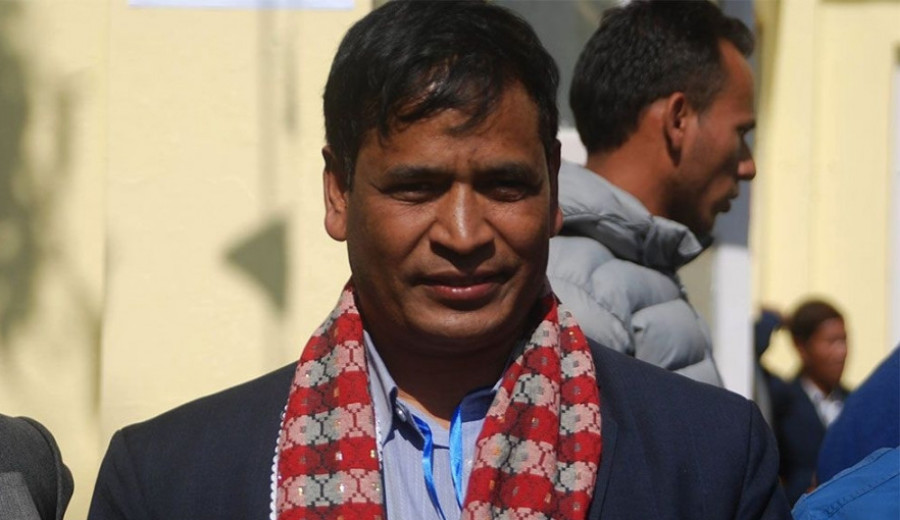National
Karnali chief minister survives vote of confidence as four UML members defy whip
The decision to cross the floor is aimed at sending across a message to Oli, says a leader who decided to vote to save the Maoist Centre provincial government.
Tika R Pradhan
Karnali Chief Minister Mahendra Bahadur Shahi, who was set to become the first casualty of the feud between the CPN-UML and the Communist Party of Nepal (Maoist Centre), managed to secure a vote of confidence, thanks to four UML Provincial Assembly members who decided to cross the floor on Friday.
Shahi, a Maoist Centre leader, was elected chief minister in February 2018 as part of a power-sharing deal between the UML and the Maoist Centre which had merged to form the Nepal Communist Party (NCP) in May 2018.
However, after the March 7 decision of the Supreme Court to scrap the Nepal Communist Party (NCP) and revive the UML and the Maoist Centre, the UML had withdrawn the support it had lent to Shahi on March 17. As a result, he was forced to seek a vote of confidence.
In the 40-member Karnali Provincial Assembly, the UML has 20 seats, including that of the Speaker, the Maoist Centre 12 seats, the Nepali Congress 6 and the Rastriya Prajatantra Party has 1.
Shahi needed 20 votes to survive as one provincial member had been suspended.
As the Nepali Congress and the Maoist Centre stood in favour of Shahi, the four UML members made him earn 22 votes.
“We decided to cross the floor to give a message to our party’s leaders,” said Prakash Jwala, a UML Provincial Assembly member close to Madhav Nepal. “We are ready to face any action from our Parliamentary Party.”
Besides Jwala, Kurmaraj Shahi, Nanda Singh Budha and Ammar Bahadur Thapa were the other UML leaders to defy the party’s whip issued by the Parliamentary Party leader Yam Lal Kandel. All are from the Madhav Kumar Nepal faction in the UML.
According to Jwala, five Provincial Assembly members from the Nepal faction, however, followed the party whip, as just four people were needed to save the Shahi government and send a message across to the party leadership.
“It was time we revolted against the unilateral and arbitrary decisions by our party leadership,” Jwala told the Post over the phone. “We also wanted to show that we are opposed to action taken against some of the leaders.”
After the UML was revived, Nepal, who had formed an alliance with Pushpa Kamal Dahal against Prime Minister KP Sharma Oli, was forced to return to the party.
On March 29, Oli suspended Nepal and Bhim Rawal as party members for six months. Thereafter, on April 1, Oli suspended Ghanashyam Bhusal and Surendra Pandey for six months. Oli alleged that the four leaders were working against party unity.
The four leaders’ decision to cross the floor in Karnali comes at a time when the Madhav Nepal faction in Kathmandu is indecisive over what move it should make as Oli is bent on driving it into a corner.
Shyam Shrestha, a political analyst who has followed Nepal’s leftist politics for decades, said the development in Karnali does carry a message for Oli.
“It looks like the Madhav Nepal faction is slowly gaining ground,” Shrestha told the Post. “If leaders of the Madhav Nepal faction dare to lose their seats in the House of Representatives, the Oli government could be in a crisis.”
The Madhav Nepal faction is believed to have 38 to 40 seats of the total 121 seats of the UML.
In Kathmandu, Oli, who is UML chair, has been trying to rope in the Janata Samajbadi Party, which has 32 seats in the House.
Oli and Janata Samajbadi Party, according to leaders, haved edged closer to a deal which entails he would get the Janata Samajbadi’s support for his early polls bid. Hence, if the Madhav Nepal faction decides to split, it will be even easier for Oli, as he could dissolve the House, this time constitutionally, to declare early polls.
Friday’s development in the Karnali Province, however, carries more political meaning for Oli, as it at least shows that the Madhav Nepal faction now can stand up and challenge him, according to leaders.
Shahi survived a vote of confidence on Friday just a day after a no-confidence motion was filed against Gandaki Chief Minister Prithvi Subba Gurung, a close ally of Oli.
Gurung prorogued the Provincial Assembly on Wednesday night. The opponents, however, have demanded a special session.
The Nepali Congress (15 seats), the Maoist Centre (12 seats) and the Janata Samajbadi Party (2 seats) filed a no-confidence motion on Thursday, minutes after the Maoist Centre withdrew its support to Gurung. In the 60-member assembly, Gurung will need 30 votes to survive the no-confidence motion and if the Madhav Nepal faction crosses the floor, his government will fall. The UML has 27 seats in the assembly.
Meanwhile, later on Friday, the UML Parliamentary Party of Karnali province decided to recommend the party’s Central Committee that action be initiated against the four leaders for defying the whip and crossed the floor.
Leaders of the Nepal faction, however, say that they are not afraid of any action Oli is going to take against them and their struggle against him will continue.
“We are stronger than Oli,” said Beduram Bhusal, a Standing Committee member close to Nepal. “What happened in Karnali is a message. Everyone is ready to sacrifice their posts in their fight against Oli. Any deal with Oli is now possible only if he is ready to make a concession.”




 16.12°C Kathmandu
16.12°C Kathmandu














